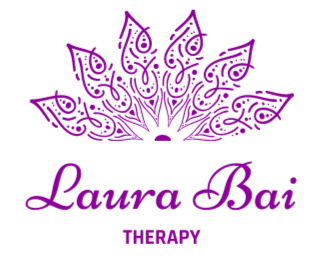
Somatic therapy
Healing for Asian-Americans
Somatic therapy offers a powerful path to healing for 1.5 and second-generation Asian-Americans navigating intergenerational trauma. As an Oakland-based therapist, I provide compassionate, body-centered care that honors both your cultural heritage and your unique healing journey, helping you reconnect with yourself through the mind-body connection.
Somatic therapy recognizes that our bodies hold the stories our families carried—the unspoken expectations, the sacrifices made, the emotions that were never given space to breathe. Through gentle, personalized practices, I help you release what has been stored in your nervous system and reconnect with a sense of safety and wholeness that may have felt out of reach.
What is Somatic Therapy?
Somatic therapy is a body psychotherapy approach that recognizes trauma and emotional distress are stored not just in the mind, but throughout the body. Unlike traditional talk therapies that focus primarily on verbal processing, somatic psychotherapy integrates body awareness and physical sensations into the healing process.
This therapeutic approach is particularly effective for Asian-American clients who may have learned to suppress emotional expression due to family expectations about showing feelings or discussing personal struggles outside the home. Through somatic therapy techniques, we can access and process emotions without requiring extensive verbal disclosure about family dynamics or cultural conflicts.
My somatic therapy care combines this mind-body approach with other evidence-based modalities including Attachment-Focused EMDR, Emotionally-Focused Therapy, and Parts Work to create comprehensive mental health support tailored to your unique background and experiences.
How Somatic Therapy Differs From Traditional Talk Therapy
While traditional talk therapies rely on cognitive processing and verbal expression, somatic therapy incorporates the autonomic nervous system and bodily sensations into healing. This makes it especially valuable for addressing:
Intergenerational trauma patterns that may not have clear memories but live in the body
Cultural adaptation stress that manifests as physical symptoms
Emotional suppression patterns learned through family and cultural expectations
Perfectionism and achievement pressure that creates chronic muscle tension
Anxiety and hypervigilance affecting both mind and body
As a somatic therapist, I help you develop body awareness skills that complement traditional therapeutic approaches, creating a more complete path to mental health and emotional well-being.
My Approach: Understanding Asian-American Experiences
Navigating Family Expectations and Individual Needs
Working specifically with Asian-American clients, I understand how growing up between cultures impacts mental health. Many of my clients carry the weight of their families' sacrifices and dreams while trying to forge their own authentic path. This tension often appears as:
Chronic pain and muscle tension from holding conflicting expectations
Sleep disturbances and digestive issues related to ongoing stress
Persistent anxiety about meeting family and professional expectations
Physical symptoms that doctors can't fully explain
Emotional numbness or feeling disconnected from your true self
My somatic therapy care addresses these struggles by helping you reconnect with your body's wisdom while finding ways to honor both your heritage and individual needs.
The Weight of the Model Minority Myth
I recognize how the pressure to be the "perfect" immigrant success story can create exhausting patterns of overachievement, people-pleasing, and self-sacrifice. These patterns don't just live in your thoughts—they show up as chronic muscle tension, shallow breathing, and a nervous system that's constantly on high alert.
Through somatic therapy techniques, we can work with these patterns not as flaws to fix, but as protective strategies that once served you but may no longer be helpful. Together, we'll explore how to maintain your strengths while creating space for rest, authenticity, and joy.
Integration with Other Therapeutic Modalities
I integrate somatic therapy techniques with several other approaches to create personalized mental health care:
Attachment-Focused EMDR processes traumatic memories while maintaining nervous system regulation through somatic awareness. This is particularly effective for intergenerational trauma that manifests through physical sensations and emotional responses rather than clear narrative memories.
Emotionally-Focused Therapy provides a framework for expressing emotions that may have been discouraged in your family or culture, combined with body awareness to create safe emotional expression without judgment.
Parts Work acknowledges the different aspects of Asian-American identity—the dutiful child, high achiever, cultural bridge-builder, and authentic individual—helping these parts find balance through bodily sensations and inner dialogue.
Couples and Family Therapy incorporates somatic awareness to help family members understand how generational patterns affect relationships while creating space for individual growth and changing dynamics.

Somatic Therapy Techniques I Use
Body Scanning and Awareness
During sessions, I guide you through body scans to develop interoception—the ability to sense internal bodily sensations. This foundational skill helps you:
Notice where you hold stress and muscle tension
Identify early warning signs of overwhelm or burnout
Recognize your body's responses to different emotions and situations
Develop greater self-awareness for ongoing mental health support
Breathwork and Nervous System Regulation
Breath is one of our most accessible tools for nervous system regulation. I teach various breathing techniques that help activate either your sympathetic nervous system (for energy) or parasympathetic nervous system (for relaxation and restoration).
These somatic therapy techniques are particularly valuable for Asian-American clients as they provide gentle ways to process emotions without requiring extensive verbal sharing about family or cultural conflicts.
Movement and Embodied Expression
Gentle movement practices help release stored emotions through physical experiences. This might include:
Simple stretching and mindful movement
Walking meditation to connect with the present moment
Expressive movement for emotional release
Exercises for relieving tension and physical pain
For clients dealing with perfectionist patterns, these practices emphasize process over outcome, helping shift away from self-judgment toward self-compassion.
Resource Activation
I help you identify internal and external resources that provide strength and safety during your healing journey. For Asian-American clients, this often includes honoring the resilience your family showed in immigrating and building a new life, connecting with cultural practices that bring joy, and recognizing the strengths you've developed navigating between worlds.
What Struggles Does Somatic Therapy Address?
My somatic therapy care is particularly effective for addressing:
Anxiety and Depression: Through nervous system regulation and body awareness, clients learn to manage symptoms by addressing their physiological roots rather than just their mental aspects.
Perfectionist Patterns: By developing self-compassion and recognizing how self-criticism shows up as chronic muscle tension and stress in the body.
Disconnection and Dissociation: Gently reconnecting with emotions and bodily sensations when you've learned to "shut off" feelings to cope with pressure or conflict.
Burnout: Learning to recognize your body's early warning signals and developing sustainable approaches to work, family, and personal responsibilities.
Caretaking and People-Pleasing: Understanding how these patterns show up physically and learning to set boundaries without guilt or shame.
Guilt and Shame: Processing these heavy emotions through somatic therapy techniques that honor your pace and comfort level.
Relationship Conflicts: Using body awareness to understand your emotional responses and develop clearer communication with family, partners, and friends.
What to Expect in Your Healing Journey
Initial Consultation (Free 20-Minute Call)
During our consultation, we'll discuss your current struggles, cultural background, and hopes for therapy. This helps me understand how family dynamics and cultural expectations may be influencing your challenges and what kind of support would feel most helpful.
First Session: Getting to Know Each Other
In your first full session, we'll explore your personal history and current concerns while beginning to build our therapeutic relationship. I'll introduce basic somatic therapy concepts and help you start noticing your body's responses to different topics or memories.
Building Foundation: Developing Body Awareness
Early sessions focus on developing body awareness and nervous system regulation skills essential for mental health. We'll practice somatic therapy techniques like body scanning, breathwork, and gentle movement that you can use both in our sessions and in daily life.
Processing and Integration
As your body awareness develops, we'll use somatic therapy techniques to work with specific experiences, emotions, or patterns. This might involve exploring intergenerational trauma, family dynamics, cultural identity questions, or current stressors affecting your mental health.
The therapeutic process combines somatic awareness with other modalities as appropriate for your needs. Some sessions focus more on body-based work and physical sensations, while others integrate conversation with somatic awareness.
Ongoing Support and Growth
Somatic therapy develops ongoing skills for emotional regulation, stress management, and authentic self-expression. As you build these somatic practices, we may meet less frequently while maintaining regular check-ins for continued support and growth.

Benefits of Somatic Therapy Care
Enhanced Mental Health and Emotional Balance
Clients develop the ability to notice and regulate emotional responses before they become overwhelming. This is particularly valuable for managing anxiety, depression, and the stress of navigating competing cultural expectations while maintaining good mental health.
Greater Self-Acceptance and Authenticity
Rather than feeling torn between family values and individual mental health needs, my approach helps you find ways to honor both. This leads to a stronger, more authentic sense of self that doesn't require rejecting your heritage or sacrificing personal well-being.
Improved Physical Symptoms
By addressing the mind-body connection, somatic therapy often improves physical symptoms connected to emotional stress. Clients frequently experience better sleep, reduced muscle tension, improved digestion, decreased chronic pain, and relief from uncomfortable sensations that may have puzzled doctors.
Sustainable Self-Care Skills
You'll learn to recognize your body's signals about stress levels and personal limits through bodily sensations. This body-based approach provides early warning signals that support sustainable mental health and help prevent burnout from overcommitting to others' expectations.
Who I Work With
My somatic therapy care is designed for Asian-American adults, particularly:
Second and 1.5 generation immigrants navigating cultural expectations
Highly educated professionals aged 25-50 dealing with achievement pressure
Individuals exploring questions of cultural identity and belonging
Those experiencing the effects of family immigration stories and trauma
People struggling with perfectionist patterns and self-criticism
Individuals seeking mental health support that understands cultural nuances
I provide care for individuals, couples, and families both in-person in Oakland and through secure online sessions.
Why Choose Somatic Therapy That Understands Your Experience?
As an Asian-American somatic therapist, I understand the unique challenges of growing up between cultures while pursuing individual mental health and authenticity. My approach recognizes that:
Traditional mental health approaches may not fully address how cultural factors shape your struggles
Family dynamics and immigration stories require nuanced understanding of loyalty, sacrifice, and expectation
Cultural values around emotional expression and family harmony need to be honored, not dismissed
Healing doesn't require choosing between cultural identity and personal growth
Mind-body approaches can be particularly effective for processing stress that comes from navigating different cultural worlds

Taking the Next Step in Your Healing Journey
If you're an Asian-American adult in Oakland or seeking online therapy, my somatic therapy care may offer the understanding and support you've been seeking. The struggles you're facing—whether perfectionism, anxiety, family pressure, or feeling disconnected from yourself—often make complete sense given the complex navigation required of those who grow up between cultures.
Your body holds wisdom about your experiences and path toward healing. Through somatic therapy techniques, we can access this wisdom to create the authentic, sustainable life you truly want while maintaining meaningful connections to your heritage and family.
During our free 20-minute consultation, we'll explore whether somatic therapy feels right for your specific needs and goals. Together, we can discuss how to create a therapeutic experience that serves your growth and well-being through compassionate, understanding care.
Ready to begin your healing journey? Contact me today to schedule your free consultation and learn how somatic therapy can support your mental health and emotional well-being. I'm here to help you navigate the intersection of cultural identity and personal authenticity through the powerful mind-body connection that somatic therapy provides.
Location:
Oakland, CA
FREQUENTLY ASKED QUESTIONS
-
Somatic therapy is a body-centered approach to healing that recognizes how our experiences, especially stress and trauma, become stored in our physical bodies. Rather than relying on talk therapy alone, somatic work helps you tune into bodily sensations, tension patterns, and nervous system responses. Through gentle awareness and guided practices, you can begin to release what your body has been holding and restore a greater sense of ease and connection.
-
While traditional talk therapy focuses primarily on thoughts, beliefs, and verbal processing, somatic therapy invites the body into the conversation. Many of us have learned to live from the neck up, disconnected from physical sensations and cues. Somatic work helps bridge that gap by exploring how emotions and experiences live in your body, offering a pathway to healing that words alone may not reach.
-
Each session is tailored to your needs, but you can generally expect a combination of conversation and body-focused practices. I may guide you to notice sensations in your body, explore your breath, or try gentle movements. We work at your pace, and you remain fully clothed and in control throughout. The goal is to help you develop a deeper relationship with your body and its wisdom.
-
Yes, somatic therapy can be particularly supportive for those experiencing anxiety. Anxiety often manifests physically through a racing heart, shallow breathing, muscle tension, or a persistent sense of unease. Somatic practices help you recognize these signals, regulate your nervous system, and develop tools to find calm when anxiety arises. Over time, many people find they feel more grounded and less overtaken by anxious responses.
-
Somatic therapy is well suited for addressing intergenerational trauma because this type of trauma often lives beneath conscious awareness. The stress, grief, and survival patterns of previous generations can be passed down through family dynamics, nonverbal communication, and even our nervous systems. Somatic work allows you to access and gently release these inherited patterns, creating space for new ways of being that honor your history while freeing you from its weight.
-
Not at all. Somatic therapy is helpful for anyone who feels disconnected from their body, experiences chronic stress or tension, or senses that something feels "stuck" even if they cannot name it. You do not need a specific event or diagnosis to benefit. Many people seek somatic work simply because they want to feel more present, embodied, and at ease in their daily lives.
-
Healing is not linear, and the timeline varies for each person. Some people notice shifts in how they feel after just a few sessions, while deeper patterns may take longer to unwind. I encourage you to approach this work with patience and curiosity rather than rigid expectations. Together, we will check in regularly about your progress and adjust our approach to meet your evolving needs.
-
Somatic principles can certainly be woven into couples and family work. Our relational patterns often show up in our bodies through how we hold tension during conflict, how we physically withdraw or move toward others, and how our nervous systems respond to those we love. Incorporating body awareness into couples or family sessions can deepen understanding and help create new, healthier ways of connecting.
-
This is more common than you might think, and it is actually one of the reasons people seek somatic therapy. Disconnection from the body is often a protective response that developed over time. We will start slowly and gently, building your capacity to notice sensations without overwhelm. There is no right or wrong way to experience your body, and I will meet you exactly where you are.
-
If you have tried talk therapy and felt like something was missing, if you carry tension or stress in your body, or if you sense that your struggles are not fully captured by words alone, somatic therapy may be a good fit. I offer a free 20 minute consultation where we can talk about what you are experiencing and explore whether this approach feels right for your healing journey. Please reach out to schedule a time to connect.












